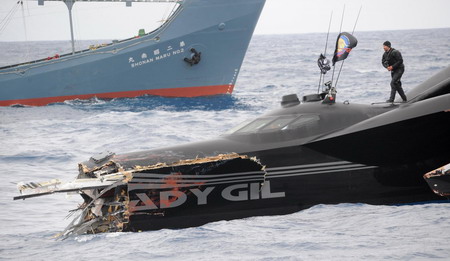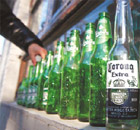Asia-Pacific
Activists pursue Japanese whalers by helicopter
(Agencies)
Updated: 2010-01-07 19:23
 |
Large Medium Small |
|
|
SYDNEY: An aggressive conservation group searched Antarctic waters by helicopter Thursday for a key Japanese whaling ship, renewing its relentless pursuit of the hunters just one day after one of its boats was wrecked in a clash.
The chopper from Sea Shepherd Conservation Society's main ship was trying to find the Japanese fleet's whale processing ship and resume attempts to harass the whalers into giving up their hunt, the group's founder and ship captain Paul Watson said.
The group's two other vessels -- including the futuristic trimaran Ady Gil that was struck Wednesday -- were tied together in another location, near Commonwealth Bay.
Activists were removing fuel and other potential pollutants from the Ady Gil in anticipation of its sinking, Watson told The Associated Press.
Each side blamed the other for the crash and showed no signs of backing down.
"The series of sabotage acts by the Sea Shepherd were very dangerous and risked the life and safety of the Japanese crew members. These acts should be strongly condemned," Yasuhisa Kawamura, a spokesman for Japan's Foreign Ministry, told reporters in Tokyo. "Violence will not contribute to the final solution of this issue."
Watson vowed his group would not step back, saying "we now have a real whale war on our hands."
New Zealand and Australia launched an investigation and renewed oft-repeated appeals for both sides to show restraint, warning that both human lives and Antarctica's pristine environment could be at risk.
It is not clear what, if any, legal action could be taken over the crash.
Don Rothwell, an international maritime law expert at the Australian National University who has advised the government on whaling, said it was possible Sea Shepherd could sue the whaling ship's master for negligence. But the whalers could also try to have the Ady Gil charged with terrorism at sea for trying to foul its navigation systems.
In either situation, such a case would likely be brought to court in New Zealand because that is where the Ady Gil is registered.
But any case would be problematic because the sovereignty of the waters where the clash occurred are not clear cut, and because the remote location means resolving the claims and counterclaims of each side would be extremely tough, Rothwell said.
"I am not suggesting they were completely at fault yesterday, but Sea Shepherd operate really at the very outer edge of the law and it is amazing what they get away with," he said.
Wednesday's clash was the most serious yet between the two sides, Rothwell said, and with no clear way to resolve the issue, the confrontation could easily escalate further.











